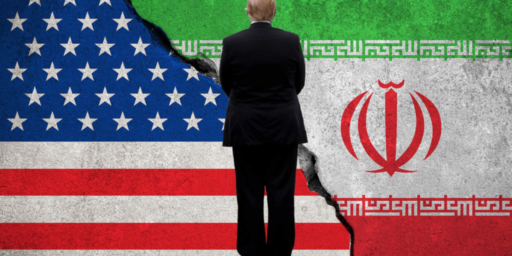Iran Makes Warning on Nukes
Iran has stepped up its rhetoric in its ongoing clash with the international community over its nuclear program.
Iran’s top leader Ayatollah Ali Khamenei warned Wednesday the country will pursue nuclear activities outside international regulations if the U.N. Security Council insists it stop uranium enrichment. “Until today, what we have done has been in accordance with international regulations,” Khamenei said. “But if they take illegal actions, we too can take illegal actions and will do so.”
Iran’s program is in violation of any number of International Atomic Energy Agency (IAEA) and U.N. Security Council resolutions, not to mention the Non-Proliferation Treaty, thus threats to “pursue nuclear activities outside international regulations” or “take illegal actions” are laughable.
These, much less so:
Iran’s top leader also issued a stark warning to the United States, saying Iran will “use all its capacities to strike” its enemies if his country is attacked. “If they want to treat us with threats and enforcement of coercion and violence, undoubtedly they must know that the Iranian nation and authorities will use all their capacities to strike enemies that attack,” Khamenei told the nation in an address marking the first day of Nowruz, or the Persian New Year.
There’s not much doubt about that.
UPDATE: Ray Takeyh makes an interesting argument in the current Foreign Affairs. His thesis:
If it hopes to tame Iran, the United States must rethink its strategy from the ground up. The Islamic Republic is not going away anytime soon, and its growing regional influence cannot be limited. Washington must eschew superficially appealing military options, the prospect of conditional talks, and its policy of containing Iran in favor of a new policy of détente. In particular, it should offer pragmatists in Tehran a chance to resume diplomatic and economic relations. Thus armed with the prospect of a new relationship with the United States, the pragmatists would be in a position to sideline the radicals in Tehran and try to tip the balance of power in their own favor. The sooner Washington recognizes these truths and finally normalizes relations with its most enduring Middle Eastern foe, the better.
That’s likely the least bad option.






I think we need to send these clowns a Happy Nowruz present of a bunker-buster bomb and nip this thing in the bud now!
And yet there are people out there who believe that Iranian nukes are a Bush lie to get us into a war with Iran.
Iran seems to be merely following the North Korea playbook, and doubling down on it’s
betsthreats every time something goes against them. Who exactly is surprised by this?Whether Iran has a nuclear weapons development program is completely a question of what standard of proof is required to satisfy you.
If you require metaphysical certitude, that’s not available. It will never be available. Not even if nuclear-armed missiles with “Made in Iran” start raining down on Tel Aviv. If you require proof beyond reasonable doubt, that’s not available either. We don’t have a smoking gun, eyewitness testimony, or any other real, hard proof.
I do think that a preponderance of the evidence supports the belief that Iran has a nuclear weapons development program and I’ve posted extensively on that and, I think, made the case pretty well.
I don’t think that level of proof is enough to support a preventive attack. I think it’s more than enough to support sanctions and the financial sanctions we’re imposing on the Iranians seem to be having some effect. The Russians latest move is an indication of that, I think.
I also think it would be prudent to stop with the saber-rattling and do some serious negotiating with the Iranians. We both have legitimate interests in the region and will continue to do so for the foreseeable future.
Mr. Schuler, your response begs the question of what might constitute a level of proof that would support a preemptive attack, or is it just a rhetorical gimmick to oppose all preemptive strikes? As for neogitating with the Iranian government, it takes two to tango and they’ve shown little interest in good faith bargaining since, oh, 1979 or so. What has changed that justifies your faith that it is possible to engage in “serious bargaining” with a charter member of the Axis of Evil? And do you mean to imply that it is the US that is the problem when it comes to “serious” negotiations with Iran? I mean, the EU sans sabers, much less saber-rattling, couldn’t manage to reach an accomodation with Iran, even with their superior diplomatic sophistication and willingness to accept all responsibility in perpetuity, so how are we supposed to?
charles austin, you are misusing the term “preemptive attack”. An attack can only be deemed preemptive when you have reasonable proof that an attack is imminent. When you have proof neither of the imminence of the attack nor of the existence of the weapons that you believe you will be attacked with, it is not, by definition, a preemptive attack.
What you are describing is called a “preventive attack”. Preventive attacks are not in general moral nor are they justified under the laws of war.
If we had reasonable proof (proof, not inference) that Iran had nuclear weapons, the next time that Ahmadinejad made one of his frothing “wipe Israel off the map” statements (presumably appealing to the peanut gallery), I would support a nuclear attack in force of Iran. I have not seen such proof. If you’ve got it, bring it out. The world is waiting.
James, re: the quote from Ray Tayekh and your support for it. It’s nice to see that others agree with me.
Definition of “reasonable proof”: eyewitness testimony (multiple independent sources), Iranian government documents of verifiable authenticity, admission or demonstration, etc. Not hard to understand. But not inference.
Ray Takeyh’s argument for detente with Iran is similar to the detente arguments with the Soviet Union. Detente did not bring out pragmatists, it simply gave hardliners breathing room. I don’t see how the calculus changes for Iran. And “its growing regional influence cannot be limited” shows a failure of imagination.
“The islamic republic is not going away anytime soon…” Uh-oh. Sounds like somebody just got jinxed…
Moderates in the Iranian government. I think that’s the punchline for a joke from the 80s. It goes something like this,
“Who persuaded Ronald Reagan to trade TOW and Hawk parts for the return of US hostages held in Lebanon?”
Mr. Schuler, I understand your point regarding preemptive vice preventive, and I apologize for substituting one for the other. It was cetainly not my intent to intentionally misinterpret your comment.
(Essay length response deleted.)
I would say that at a minimum you will need to know what is being attacked any why. Israel the what and why when they took out Iraq’s nuclear facility. So far with Iran we have neither.
Because of the fact that Iran knew that the EU didn’t really matter without the US. They snubbed the EU as an attempt to get recognition from the US that they are equals at the negotiating table. It’s the same reason N.Korea wants one on one negotiations, and why the US continues to avoid it.
Ho Hum.
“All options are on the table”
“We will do what we are doing, illegally, if need be”
Two sides of the same coin. Call it Belligerent Diplomacy.
James & Ray seem to have the best idea, which is better than the best bad option.
The lie is all the talk of an “immanent” threat when all the intelligence puts them at 5-10 years away from producing enough uranium for a single bomb.
as for this:
Well gosh, that sounds almost exactly like what us dirty hippies have been saying for years. Maybe next time you guys can skip all the screw ups and just do what we suggested in the first place. It’ll save a lot of lives and a hell of a lot of money.
This is the same intelligence that disagreed with Iranian resistance groups comments about enrichment facilities. I am afraid the intelligence services have not covered themselves in glory with their predictions.
Oh ok, I guess we should be planning for our war against Iran 5-10 years from now when it’s really a problem.
They aren’t hiding their intentions here. I think it’s a more prudent course to take them at their word and make hard decisions (not necessarily war) now, rather than wait till the nukes are flying and figure things out then.